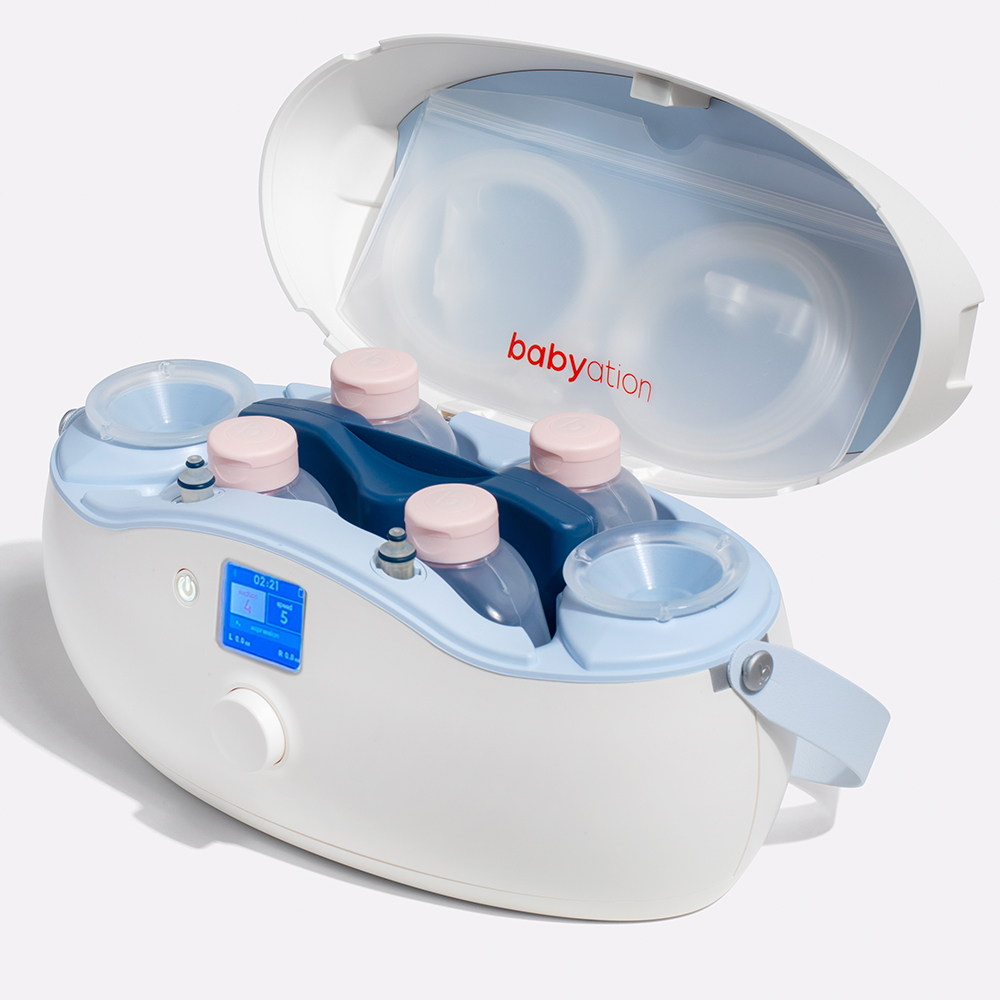“Dairy cows don’t put up with what women put up with,” sighs Samantha Rudolph, CEO at Babyation, a St. Louis, Missouri-based company that is today launching a brand new solution for breast-pumping mothers. The company is taking a more holistic approach than most, with an all-in-one system focused especially on stealth. The solution comes in an all-in-one carrying bag that includes cooling packs, storage and stealthy breast shields worn inside a bra. The setup is controlled from an app, making it possible to pump in quiet comfort, even while out and about in the world.
A recent study showed that the vast majority of women say that pumping is the worst part of breastfeeding. That’s a hell of a statistic, given that 95% of nursing mothers pump, and as someone who hasn’t had to use a breast pump, it doesn’t take a lot of research to get confirmation: It sounds pretty awful. The milk has to come out somehow, though — you can’t change biology. Babyation’s take is that if they can’t make it a loved process, they can at least do what they can to make sure it isn’t outright hated.
“We designed our product to optimize for an entire day of pumping. We minimize what’s on the body, then we have built-in storage,” explains Rudolph. It’s hard to overstate how helpful that is; a lot of breast pumps sell just a bottle and a pump, but you’re left with a storage problem and the potential awkwardness of having to leave a bottle of milk in the office fridge. “In other solutions, if I forget any one of these little parts, my pump doesn’t work, and then I’m either uncomfortable, or my milk supply is decreasing. We optimized and put everything in one spot.”
The innovation is that it’s possible to wear the wearables underneath your clothing, and have a small, inconspicuous tube run into the storage bag on the floor. The suction itself comes from a new technology that reflects nature, rather than taking a page out of the dairy industry’s playbook. The company has 11 patents protecting its tech.
“The way we derive our suction is that the device actually collapses on the nipple. It’s how babies suck. The FDA is actually allowing us to say that our suction mimics babies’. No other product can do that,” says Rudolph, and takes me on a journey of how the competition does things. “If you look at [competitor’s] patents, most of them are based on dairy cow technology.”

Babyation’s breast pump and storage solution means that mothers can ensure that they have everything they need at a glance. If something is missing from a storage slot, it’s super obvious. Image Credits: Babyation
In the industry, most lactation consultants will tell you that breast pumps can’t express as much milk as a baby, but the Babyation team has a trick up its shirt — proverbially as well as literally — with extraordinary efficacy.
“In testing, 100% of women got out as much milk with our pump, compared with the pump that they usually use. Fifty percent of the time our pump got out more milk than a baby,” Rudolph says. The team is proud of the efficiency, and angry it has taken the industry this long to get there. “Innovation in this space does take time, but I think that part of the reason it’s taken so long, is that for a very long time it was ignored. I think we’ve solved this in a way that has never been done before. I think that our numbers are proving that it’s game-changing. But also, it’s not rocket science to be quiet, discreet and smart. We did not reinvent the way milk is produced. So the fact that women have had to live so long with these outdated solutions is just madness to me.”
Part of the company’s dedication to stealth meant moving the controls for the device to an app, rather than for users having to fiddle around underneath their clothing. The app tracks how much milk has been expressed, it can control the pump remotely and it can track inventory. That way, nursing mothers can know how much milk there is in the fridge and in the freezer and track consumption.

Babyation optimizes for discretion. Image Credit: Babyation
“We actually built an entire feeding app. So if I have a caregiver, I can ask the caregiver to feed a specific bottle of milk, and then that will deplete from my inventory. We also track breastfeeding and we track formula feeding as well. We really tried to put a lot of thought into the app,” explains Rudolph. “We also have an auto-start and auto-stop; if I’m on a call at 3 pm but I know I usually pump at 3:30, I can do that without fiddling around with the pump — that would be the antithesis of discretion. Discretion is our north star.”
The company told me it has more than 4,500 people on the wait list for its product, which bodes well for its launch today. Babyation is primarily a direct-to-consumer brand, and the company is selling its system for $499.
